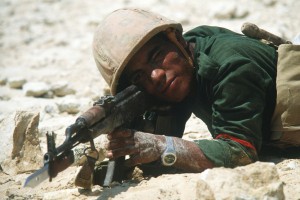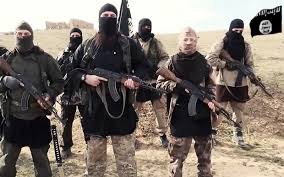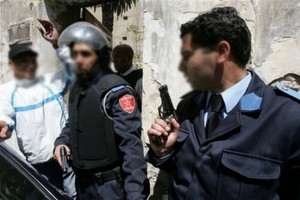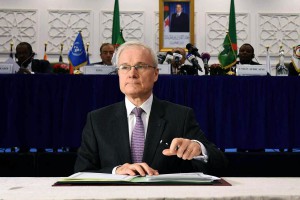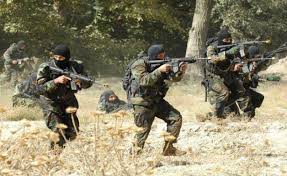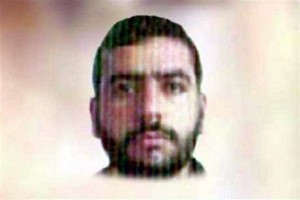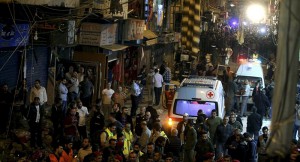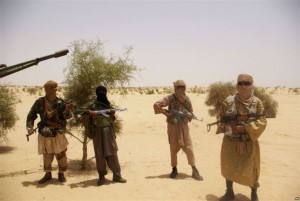Islamic State tightens grip in central Libya
Islamic State militants have consolidated control over central Libya, carrying out summary executions, beheadings and amputations, the United Nations said on Monday in a further illustration of the North African state’s descent into anarchy.
All sides in Libya’s multiple armed conflicts are committing breaches of international law that may amount to war crimes, including abductions, torture and the killing of civilians, according to a UN report.
Islamic State (IS) has gained control over swathes of territory, “committing gross abuses including public summary executions of individuals based on their religion or political allegiance”, the joint report by the UN High Commissioner for Human Rights and the UN Support Mission in Libya said.
The UN had documented IS executions in their stronghold city of Sirte, in central Libya along the Mediterranean coast, and in Derna to the east, from which they were later ousted by local militias. Victims included Egyptian Copts, Ethiopians, Eritreans and a South Sudanese, the report said.
Some were accused of “treason”, others of same-sex relations, but none were given due legal process, according to the report, which covered the year through October.
Libyan armed groups pledging allegiance to IS-controlled areas of central Libya including Sirte, Harawa and Nofliya, and have claimed responsibility for attacks, including on oil fields, checkpoints and petrol stations, the report said.
Four years after the overthrow of Muammar Gaddafi, Libya is locked in a conflict between two rival governments – an official one in the east and a self-declared one controlling the capital Tripoli – and the many armed factions that back them.
All parties to the conflicts were violating international human rights law by committing indiscriminate attacks that harmed civilians, including summary executions, arbitrary imprisonment and use of torture, the UN report said.
Perpetrators, including political leaders and commanders of armed groups, are liable to prosecution by the International Criminal Court, it said, and the Hague-based ICC was already investigating the situation.
“Many migrants, asylum seekers and refugees become victims of brutal violence, coercion and abuse perpetrated by smugglers along smuggling routes, as well as in so-called ‘connection houses’, where they await departure to Europe,” the report said.
The report also said warring factions had used imprecise weaponry in densely-populated residential areas, often resulting in indiscriminate attacks causing civilian deaths and damage to infrastructure including hospitals.
iol.co.za
Morocco arrests four suspected of having links to Islamic State
Moroccan police have arrested four people suspected of belonging to a militant cell linked to Islamic State, the interior ministry said on Monday.
The cell, the latest of a series of Islamist militant groups the authorities say they have uncovered, had been active in the central city of Beni Mellal, the ministry said in a statement.
France calls for extra security measures in Algeria
French Ambassador in Algiers Bernard Emié yesterday called on the Algerian authorities to strengthen security measures around French establishments in the country after the bloody attacks that targeted the French capital, Paris, on Friday, Turkey’s Anadolu Agency reported.
In a statement addressed to the French community and posted on the embassy site, Emié said: “I invite you to be calm and vigilant and follow the safety tips carefully both from the Algerian authorities about travel within the country or travel advice issued by the French Ministry of Foreign Affairs.”
The ambassador stressed that the goal is to “protect French citizens, whether at home or abroad, because those who targeted Paris could target the country’s missions abroad.”
The French embassy announced three days of national mourning.
middleeastmonitor.com
3 islamist militants, one soldier killed in Tunisia clashes
At least three Islamist militants and a Tunisian soldier were killed on Sunday in clashes in the central Kasserine province, near the Algerian border, a security source said.
Islamic State militants have claimed two major attacks on foreign tourists this year in Tunisia, and the army is fighting a low-level conflict against pockets of other militants in rural areas near the frontier with Algeria.
Sunday’s clashes came two days after Islamist militants beheaded a Tunisian teenager in the central province of Sidi Bouzid and sent his head to his family after accusing him of spying for the military.
“At least three terrorists and one soldier were killed in violent clashes at Mguila Mountain, in a counter-strike operation after terrorists beheaded the 16-year-old,” the source said.
Four years after ousting autocrat Zine El-Abidine Ben Ali and inspiring the “Arab Spring” protests, Tunisia has a new democratic constitution and a freely-elected coalition government with secular and Islamist parties.
But more than 3,000 Tunisians have left to fight for Islamist militant groups in Syria, Iraq and neighboring Libya. Some of those jihadists have threatened to return home and carry out attacks on Tunisian soil.
In March, Islamist gunmen killed 21 tourists in an attack at the Bardo Museum in Tunis, and 38 foreigners were killed by another gunman in an assault on a Sousse beach hotel in June.
Officials said the attackers had been trained in jihadist camps over the border in Libya, where chaos has allowed Islamist militants to grow in strength. The U.S. military said it believed it had killed a major Islamic State commander in an air strike on the Libyan city of Derna last week.
Libya groups clash with Islamic State in east
Gunmen including Islamist fighters battled jihadists from the Islamic State group on Sunday south of Libya’s eastern coastal city of Derna, media and ISIS said.
Reports of the clashes come a day after the Pentagon announced the killing of a senior ISIS jihadist in Libya in an air strike carried out by a US F-15 warplane.
Abu Nabil, also known as Wissam Najm Abd Zayd al-Zubaydi, was the senior ISIS leader in Libya and may also have been the spokesperson in a grisly video showing the execution of Coptic Christians earlier this year, Pentagon spokesperson Peter Cook said in a statemen
Libyan authorities have not commented on the US announcement, and there has been no immediate reaction to it from the Islamic State group in Libya.
ISIS, which already controls large swathes of territory in Iraq and Syria, has exploited the chaos that has spread across Libya since veteran dictator Moamer Kadhafi was toppled and killed in a 2011 uprising.
The jihadist group entered Derna a year ago but said in July it had lost control of the city after weeks of fierce fighting with members of the Mujahedeen Council of Derna.
Its gunmen ousted ISIS from many areas of the city controlled for more than a year by armed groups including Ansar al-Sharia, which is close to Al-Qaeda.
According to media reports Sunday, including Al-Nabaa television, the Mujahedeen Council of Derna has launched a new campaign to drive IS out of the region.
It said the latest clashes were taking place in Al-Fatayeh, 20km south of Derna.
ISIS, in a statement on its Twitter account, also reported that its fighters were battling “heretics” near Derna on Sunday and claimed responsibility for a suicide car bomb attack south of the city targeting “apostates”.
Since June, the jihadist group has also controlled the coastal city of Sirte, the home town of Kadhafi.
news24.com
US airstrike kills top Islamic State leader Abu Nabil in Libya
The head of the Islamic State in Libya has been killed in a US airstrike, the Pentagon has announced, days after an American drone hit claimed the life of the terror group’s dreaded executioner Jihadi John.
The US military on Friday conducted an airstrike in Libya against Abu Nabil, also known as Wissam Najm Abd Zayd al-Zubaydi, an Iraqi national, who was a long time al-Qaeda operative and later the senior Islamic State leader in Libya, Pentagon Press Secretary Peter Cook said yesterday.
The attack against Abu Nabil was carried out by US F-15 fighter jets, officials said. The Pentagon announcement comes as the Islamic State terror group claimed responsibility for Friday’s attacks in Paris that killed at least 129 people during mayhem of bombings and shooting. The Pentagon, however, said the two events were not connected.
Cook said reporting suggested Nabil may also have been the spokesman in the February 2015 Coptic Christian execution video.
“Nabil’s death will degrade ISIS’s ability to meet the group’s objectives in Libya, including recruiting new ISIL members, establishing bases in Libya, and planning external attacks on the US,” Cook said.
“While not the first US strike against terrorists in Libya, this is the first US strike against an ISIS leader in Libya and it demonstrates we will go after ISIS leaders wherever they operate,” he said.
Cook, however, noted that this operation was authorised and initiated prior to the terrorist attack in Paris. Nabil’s death comes days after dreaded Islamic State executioner Jihadi John was killed in a US drone strike.
Although one or two officials in Washington are counselling caution, there is now an overwhelming consensus that Jihadi John was killed in the drone strike along with a sympathiser – possibly his driver – as their car hurtled through the Syrian town of Raqqa.
Gradually details of how the British Jihadist was tracked down and then attacked by a drone have started to emerge. A British drone, operating from Lincolnshire, helped track Jihadi John, although what are believed to have been the fatal shots were fired by the Americans. According to one report he was tracked for six weeks before the decisive strike was made.
ibnlive.com
Russia ready to support Lebanon in countering terrorism, especially ISIL
On Thursday, two suicide bombings occurred consecutively in the outskirts of the Lebanese capital of Beirut, claiming the lives of at least 43 people. Following the attack, for which ISIL has claimed responsibility, Russian President Vladimir Putin sent a telegram of condolence to Nabih Berri, speaker of the Lebanese Parliament.
Al-Azhar condemn terrorist attack in Lebanon
Egypt strongly condemned a Thursday terrorist attack in Lebanon that was claimed by the Islamic State (IS) group that resulted in the deaths of 43 people, with 240 wounded, according to a statement by the Foreign Ministry.
The statement assured “Egypt is standing by brotherly state, government and people in this critical circumstance.”
Another statement was released by Islamic institute Al-Azhar denouncing the explosion, which took place in the Borj al-Barajneh residential district in Beirut’s southern suburbs.
The Al-Azhar called on Lebanese parties to “lineup in the face of conspiracies targeting the unity of their land.”
The IS claimed Thursday responsibility of two suicide bomb blasts targeted the suburb, which is a stronghold of the Shi’ite Muslim group Hezbollah.
thecairopost.com
From terror to counterterror in North Africa
Over the past several months, an encouraging trend has begun to emerge in North Africa: the number of jihadist recruits for Daesh, particularly from Morocco, has begun to diminish, owing largely to the implementation of rigorous security measures.
But, if the threat is to be eliminated entirely, much more work needs to be done.
The recent downwards trend follows an alarming spike in recruitment by Daesh from the region. In June 2014, a staggering 1,193 Moroccans were reportedly fighting in Syria and Iraq, according to General Director of Studies and Documentation (DGED) Mohamed Yassine El Mansouri.
An April 2015 report by the United Nations Counter-Terrorism Committee revealed that Moroccans and Tunisians constitute the largest foreign contingent of jihadists in Iraq and Syria.
A key component of Daesh’s appeal is economic.
A jihadist earns, on average, $1,400 per month — a substantial sum for young men, often from poor families, who are unemployed or doing odd jobs at home for some $150 a month.
Given that many Moroccan jihadists have only a primary-level education, with only 10 per cent holding a university degree, opportunities for economic advancement at home seem limited.
Of course, there are also personal factors, though religion seems to come second to visions of adventure and bravery in battle.
Whether to become a “hero” or to make money, 30 Moroccans, on average, have joined Daesh each month since the Syrian civil war began.
But now the rate has slowed considerably.
According to the Moroccan North Observatory of Human Rights, only 16 Moroccan jihadists travelled to Syria and Iraq in the first six months of this year.
The decline can be attributed to several factors.
For starters, the pool of potential extremists is limited and Daesh has largely emptied it. Nor is it likely to be replenished, because Daesh has been exposed as a fraud.
Not only is life in the jihadist camps far less pleasant than portrayed, but it is also becoming clear that the self-proclaimed caliphate — centred on mass killings, decapitations and other atrocities — has nothing to do with Islam.
As is true in North Africa, local populations in Syria and Iraq loath foreign jihadists, whom they view as mercenaries seeking power and wealth, rather than true defenders of Islam.
Moreover, the Moroccan state has made an extraordinary effort to prevent the departure of new recruits to Iraq and Syria, and to avert terrorist attacks at home.
At the same time, would-be jihadists have become aware of what would await them were they ever to return to Morocco: imprisonment for up to 15 years, in addition to ruthless police interrogations and severe detention conditions.
But the decline in recruitment does not mean the time has come to ease anti-terror measures.
Terrorists will often step back to gain time to replenish their arsenals, develop new tactics, and attract and train fresh fighters.
And, indeed, as the UN report underscored, Daesh remains skilled at using social networks to attract and indoctrinate young people across the region.
Moreover, there remains a serious risk of terrorist attacks at home, especially as attacks by “lone wolves” — like the killing of 38 tourists in Tunisia in June, or the attempted attack in August on a Paris-bound Thalys train — become more prevalent.
That is why Morocco has been engaged in a multifaceted strategy to stop terrorists before they carry out attacks.
The strategy involves monitoring the religious field; reforming the penal code; fighting social exclusion through the National Initiative for Human Development, launched by the government in 2005; and implementing the enhanced security apparatus “Hadar”.
The strategy has so far proved effective. In a recent interview, Moroccan Interior Minister Mohamed Hassad revealed that police dismantled 27 jihadist cells in 2013-2014, and eight more in the first five months of this year, leading to a total of more than 200 arrests.
But Morocco has not been working alone. Recognising that terrorism is an international problem, it is coordinating its counterterrorism efforts with its allies, particularly Spain and France.
Recently, coordination with Spanish security forces enabled Morocco’s domestic intelligence agency to discover and dismantle a nine-member terrorist network, which was actively recruiting and sending young Moroccans to fight for Daesh.
Such efforts have earned Morocco international recognition. In May, for example, the country was chosen to co-chair the Global Counterterrorism Forum.
To confront terrorism in North Africa and beyond, Morocco will have to continue to address the threat from all angles: intelligence, law enforcement, and social policy. As evidence of Morocco’s success emerges, other countries should take note.
- « Previous Page
- 1
- …
- 179
- 180
- 181
- 182
- 183
- …
- 248
- Next Page »
